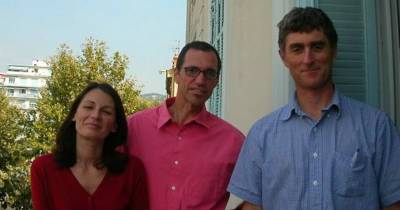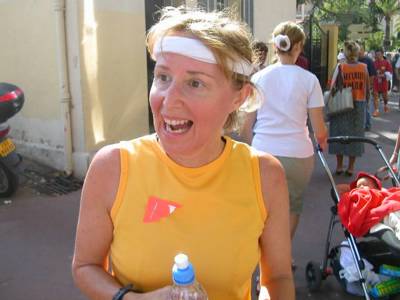
Ged Jones, a 15-year veteran of the Royal Mail, after stopping a second time to help us navigate our rental car back to Oriel College.
Saturday, September 25, 2004
Oriel College, Oxford
Well, the rain flowed today, and so did everything else, by which I mean we seemed to be guided as much by coincidences and mistakes as by our plans for the day. I left the Hopkins conference an hour early by mistake, but that provided enough time this morning to stumble across an Enterprise Car Rental office willing to give us the family rate (my daughter Roo works for Enterprise in San Francisco) for tomorrow’s exploration of the Cotswolds. But the office was closing in 20 minutes. We flagged a cab that got us there with five minutes to spare. The Renault Megane was great, but it had a manual transmission. So my initiation in left-lane driving bore the added challenge of shifting with my left hand. I asked a postman for directions to Oriel College, then lurched down one-way streets and alleys before ending up, lost again, at the Visitor’s Bureau. While Darlene was inside getting a map, someone knocked on my window and I was sure it was a bobby with a parking ticket. Instead it was Jed Jones, the Royal Postman, who remembered our car and had walked over to try to help us again. We finally made it to Oriel, where the staff unlocked the lane in front of our dorm, and the Megane is safely parked for the night.
In the midst of these Hercule Poirot-style bumblings, Darlene and I each stumbled across new creative leads. She found a book of fish photos that she hopes to work into future quilts, and an inspiring poster of Marilyn Monroe on a bench lifting dumbbells. She also discovered a place for a sumptuous tea. I was struck by a profile of the late Edward Said in The Guardian and then in Blackwells happened upon his last book, Humanism and Democratic Criticism, which I bought on a hunch that it may contain new approaches to book reviewing.
The final banquet was held tonight in Oriel's main hall, which after dark seemed even more like a scene from Harry Potter’s Hogwarth, with stern portraits glaring down at us from the high walls, including a huge illuminated rendering of Her Royal Highness herself.
Well, the rain flowed today, and so did everything else, by which I mean we seemed to be guided as much by coincidences and mistakes as by our plans for the day. I left the Hopkins conference an hour early by mistake, but that provided enough time this morning to stumble across an Enterprise Car Rental office willing to give us the family rate (my daughter Roo works for Enterprise in San Francisco) for tomorrow’s exploration of the Cotswolds. But the office was closing in 20 minutes. We flagged a cab that got us there with five minutes to spare. The Renault Megane was great, but it had a manual transmission. So my initiation in left-lane driving bore the added challenge of shifting with my left hand. I asked a postman for directions to Oriel College, then lurched down one-way streets and alleys before ending up, lost again, at the Visitor’s Bureau. While Darlene was inside getting a map, someone knocked on my window and I was sure it was a bobby with a parking ticket. Instead it was Jed Jones, the Royal Postman, who remembered our car and had walked over to try to help us again. We finally made it to Oriel, where the staff unlocked the lane in front of our dorm, and the Megane is safely parked for the night.
In the midst of these Hercule Poirot-style bumblings, Darlene and I each stumbled across new creative leads. She found a book of fish photos that she hopes to work into future quilts, and an inspiring poster of Marilyn Monroe on a bench lifting dumbbells. She also discovered a place for a sumptuous tea. I was struck by a profile of the late Edward Said in The Guardian and then in Blackwells happened upon his last book, Humanism and Democratic Criticism, which I bought on a hunch that it may contain new approaches to book reviewing.
The final banquet was held tonight in Oriel's main hall, which after dark seemed even more like a scene from Harry Potter’s Hogwarth, with stern portraits glaring down at us from the high walls, including a huge illuminated rendering of Her Royal Highness herself.
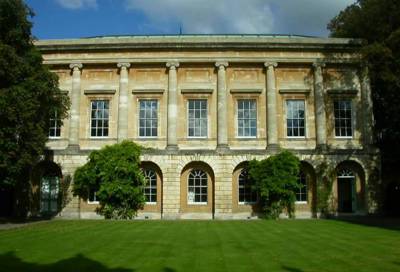
The Oriel College library, which we walked past this morning on our way to breakfast in the main hall.
Friday, September 24, 2004
Mices Internet Shop, Gloucester Green, Oxford, England
About 60 experts and devotees of Gerard Manley Hopkins are gathered at Oriel College at Oxford to present and listen to papers on a Jesuit poet who once walked these same narrow tunnels connecting the courtyards of the oldest English-speaking university in the world. Darlene and I have adjoining rooms with single beds at Oriel, which is kind of romantic in an odd way. She explored the town while I took in the lectures, which ranged from mind-numbingly pedantic to funny, fresh, and useful. This crowd gathers each year at Regis University in Denver, which is hosting the Oxford conference, and the reunions are not devoid of debate. “He’s full of shit,” one participant sitting beside me muttered at the conclusion of the day’s last lecture, which argued forcefully that Hopkins was a playful guy. This required a four-part definition of play, based on a Dutch philosopher whose name I didn’t catch. And it took some work to find the playful language in Hopkins’s famously depressed later work, which includes these lines from “I Wake and Feel”:
I am gall, I am heartburn. God’s most deep decree
Bitter would have me taste: my taste was me;
Bones built in me, flesh filled, blood brimmed the curse.
I think Hopkins is pretty great, because of his luscious language and constant grappling with opposites such as form and freedom, private inner meaning versus outer reality. He is one of my allowing models of eccentricity. He once stopped in the middle of reading to a class, paused, said, “I have never seen a naked woman; I wish I had,” then continued the reading.
About 60 experts and devotees of Gerard Manley Hopkins are gathered at Oriel College at Oxford to present and listen to papers on a Jesuit poet who once walked these same narrow tunnels connecting the courtyards of the oldest English-speaking university in the world. Darlene and I have adjoining rooms with single beds at Oriel, which is kind of romantic in an odd way. She explored the town while I took in the lectures, which ranged from mind-numbingly pedantic to funny, fresh, and useful. This crowd gathers each year at Regis University in Denver, which is hosting the Oxford conference, and the reunions are not devoid of debate. “He’s full of shit,” one participant sitting beside me muttered at the conclusion of the day’s last lecture, which argued forcefully that Hopkins was a playful guy. This required a four-part definition of play, based on a Dutch philosopher whose name I didn’t catch. And it took some work to find the playful language in Hopkins’s famously depressed later work, which includes these lines from “I Wake and Feel”:
I am gall, I am heartburn. God’s most deep decree
Bitter would have me taste: my taste was me;
Bones built in me, flesh filled, blood brimmed the curse.
I think Hopkins is pretty great, because of his luscious language and constant grappling with opposites such as form and freedom, private inner meaning versus outer reality. He is one of my allowing models of eccentricity. He once stopped in the middle of reading to a class, paused, said, “I have never seen a naked woman; I wish I had,” then continued the reading.
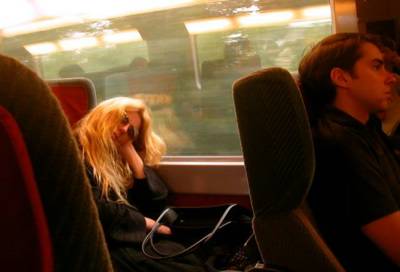
A woman who boarded the Eurostar in Paris with a white guitar case dozes on the three-hour trip to London.
Thursday, September 23, 2004
Beneath the English Channel aboard Eurostar 9031 to Waterloo Station, London
My ears feel changes in air pressure as the train glides beneath the ocean at 186 miles an hour. Passengers speak quietly, as if in church. You can hear the clink of the cups and saucers now that tea and coffee follow a lunch of pork or cod, with ruby peach mousse cake for dessert. A young French businessman across the aisle quickly covers the speaker on his Dell laptop when the Windows startup chimes threaten to make too much noise for the rest of us. It is quiet enough to sleep, as does the mysterious woman with the white guitar case. Is she famous? At this speed, I hear no sound of rails and wheels, only the train-made wind, and a low musical note, like a ringing in the ears. The floor’s vibrations massage my feet.
I have loved trains ever since I was five years old and living in Texas when my mother took my sister and me on the Santa Fe Chief. I remember feeling as if I had entered a magic kingdom of motion and sound. In the domed observation car, a stranger asked where I got such big, brown eyes and I replied, “in a Texas drug store.” Riding the Train a Grande Vitesse (TGV) yesterday from Cannes to Paris, and now aboard the Eurostar, a boyish place in me is simply ecstatic, humming along with the train itself, not wanting the trip to ever end. I want everyone in the car to be as happy as I am to be here on what may be the coolest train in the world. I want them to know they are part of something really big. I want them to look up from their laptops and cellphones and say, “Omigod, I can’t believe we’re having this much fun!” The hot towels just arrived. We’re out of the tunnel, in England on a damp, gray day. This evening Darlene and I will see “Stuff Happens,” a new play at the National Theatre in London, and then on to Oxford by express bus, arriving just before midnight.
My ears feel changes in air pressure as the train glides beneath the ocean at 186 miles an hour. Passengers speak quietly, as if in church. You can hear the clink of the cups and saucers now that tea and coffee follow a lunch of pork or cod, with ruby peach mousse cake for dessert. A young French businessman across the aisle quickly covers the speaker on his Dell laptop when the Windows startup chimes threaten to make too much noise for the rest of us. It is quiet enough to sleep, as does the mysterious woman with the white guitar case. Is she famous? At this speed, I hear no sound of rails and wheels, only the train-made wind, and a low musical note, like a ringing in the ears. The floor’s vibrations massage my feet.
I have loved trains ever since I was five years old and living in Texas when my mother took my sister and me on the Santa Fe Chief. I remember feeling as if I had entered a magic kingdom of motion and sound. In the domed observation car, a stranger asked where I got such big, brown eyes and I replied, “in a Texas drug store.” Riding the Train a Grande Vitesse (TGV) yesterday from Cannes to Paris, and now aboard the Eurostar, a boyish place in me is simply ecstatic, humming along with the train itself, not wanting the trip to ever end. I want everyone in the car to be as happy as I am to be here on what may be the coolest train in the world. I want them to know they are part of something really big. I want them to look up from their laptops and cellphones and say, “Omigod, I can’t believe we’re having this much fun!” The hot towels just arrived. We’re out of the tunnel, in England on a damp, gray day. This evening Darlene and I will see “Stuff Happens,” a new play at the National Theatre in London, and then on to Oxford by express bus, arriving just before midnight.
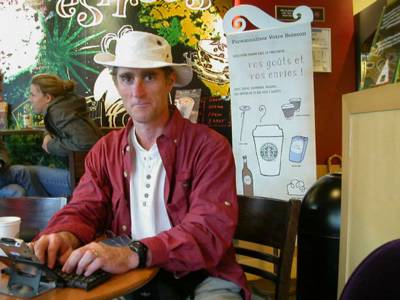
The Chronicles staff sets up shop in a Starbucks located at 70 Boulevard du Montparnasse, Paris.
Wednesday, September 22, 2004
I see no French tractors poised to plow over the latest encroachment of American culture, as one did to a McDonalds site in southwestern France five years ago. Instead, the fourth Starbucks store in Paris has a line of customers that reaches nearly to the front door, and every little round table is surrounded by mainly young patrons, mainly women. I brought my Starbucks card with me from Denver just for this moment, wondering if I would be able to charge a latte on it. The answer was "Non," and thus I lost a bet with Darlene.
The employees wear black shirts and green aprons, just as in the States, and the menu offers the usual fare, except that French customers are eased into the mind-numbing possibilities of StarWorld with a sign that advises, "How to Personalize Your Drink." (1. Choose a drink. 2. Add an espresso. 3. Choose a size, etc.) At least in France the sizes make sense. A small is "petit" instead of "tall," that phony aggrandizement which I can never quite bring myself to utter when ordering back home. The young man who took my order said "it's too busy--we can't keep up!" But some visitors apparently seek more than just a java buzz. A discrete sign in French and English warns that "des pickpockets" operate in this area. "S'il vous plait, soyez vigilants!" Please, be vigilant! Words to live by. And strong coffee helps.
The employees wear black shirts and green aprons, just as in the States, and the menu offers the usual fare, except that French customers are eased into the mind-numbing possibilities of StarWorld with a sign that advises, "How to Personalize Your Drink." (1. Choose a drink. 2. Add an espresso. 3. Choose a size, etc.) At least in France the sizes make sense. A small is "petit" instead of "tall," that phony aggrandizement which I can never quite bring myself to utter when ordering back home. The young man who took my order said "it's too busy--we can't keep up!" But some visitors apparently seek more than just a java buzz. A discrete sign in French and English warns that "des pickpockets" operate in this area. "S'il vous plait, soyez vigilants!" Please, be vigilant! Words to live by. And strong coffee helps.
Fifty-eight years ago this week, Pablo Picasso began work in a third-floor room of a chateau which the city of Antibes had converted into a museum. Until the weather turned cold in November, he arrived each afternoon to paint until late in the evening, using light from two large projectors. He donated much of the art he created there to the city, as well as some later work, all of it now displayed in the chateau, which was renamed the Picasso Museum, the first in the world to feature his art.
The room that was his studio now displays “Ulysses and the Sirens,” a 12-foot high work representing Ulysses tied to the mast of his ship to withstand the song of the Sirens. The painting’s blues and greens evoke the Mediterranean, and the face of the hero centers the scene, round and pale like a full moon, the eyes wide and the mouth seemingly sewn shut as a torrent of sea archetypes swirls around it. Picasso’s satyr-like energy left me unable to stand for long in front of the paintings. Instead, I was drawn to the windows. I watched the sea surge and withdraw from the rocks. I watched a woman in a flowing red skirt look up from the plaza. I watched a pigeon feather flutter in the breeze, stuck to the sill by a daub of dung. “Of course I can,” I sensed from somewhere indisputable. It seemed as if, looking out Picasso’s window, I could see my own work before me: obvious, necessary, and freed from doubt. Later in the gift shop, I bought a poster of “White Faun Playing the Diaulus,” because the serene and horny guy playing his music with his eyes closed looked like how I felt at Antibes. I also bought the cap, the t-shirt, the postcards, and a fat biography by Patrick O’Brien. Back home at Boulevard Carnot, I still can feel it: Of course I can!
The room that was his studio now displays “Ulysses and the Sirens,” a 12-foot high work representing Ulysses tied to the mast of his ship to withstand the song of the Sirens. The painting’s blues and greens evoke the Mediterranean, and the face of the hero centers the scene, round and pale like a full moon, the eyes wide and the mouth seemingly sewn shut as a torrent of sea archetypes swirls around it. Picasso’s satyr-like energy left me unable to stand for long in front of the paintings. Instead, I was drawn to the windows. I watched the sea surge and withdraw from the rocks. I watched a woman in a flowing red skirt look up from the plaza. I watched a pigeon feather flutter in the breeze, stuck to the sill by a daub of dung. “Of course I can,” I sensed from somewhere indisputable. It seemed as if, looking out Picasso’s window, I could see my own work before me: obvious, necessary, and freed from doubt. Later in the gift shop, I bought a poster of “White Faun Playing the Diaulus,” because the serene and horny guy playing his music with his eyes closed looked like how I felt at Antibes. I also bought the cap, the t-shirt, the postcards, and a fat biography by Patrick O’Brien. Back home at Boulevard Carnot, I still can feel it: Of course I can!
My Bennington poet friend, Steve Gregoris, is in love. Patrizia Pedrazzina grew up in Piacenza, Italy, and speaks Italian and British-accented English. He is 46; she is 41. Each has been married and involved before. They know the drill. So their three-month romance has all the freshness of first love but arrives in a calm glow. They look at each other a lot. They casually hold hands on the way to the restaurant. I always look for deep contrasts in a strong couple, and so it seems with Steve and Patrizia. He is one of the most mercurial, edgy, kind, creative, and spontaneous men I know. She seems rooted, comfortable with herself like a dark-eyed cat.
Our houseguests prepared a gourmet meal last night of swordfish, vegetables and rice. Our day an a half together moved easily from naps to reading to walks in Cannes, to animated conversation and disputes during and after dinner. They left just before noon for a nine-hour drive to Italy to visit family and friends before returning to Switzerland by Sunday. If what seems well begun between them lasts, Steve and Patrizia will have been together a year and three months when we hope to see them in Cannes again next year. Beginnings are sweet at any age.
Our houseguests prepared a gourmet meal last night of swordfish, vegetables and rice. Our day an a half together moved easily from naps to reading to walks in Cannes, to animated conversation and disputes during and after dinner. They left just before noon for a nine-hour drive to Italy to visit family and friends before returning to Switzerland by Sunday. If what seems well begun between them lasts, Steve and Patrizia will have been together a year and three months when we hope to see them in Cannes again next year. Beginnings are sweet at any age.
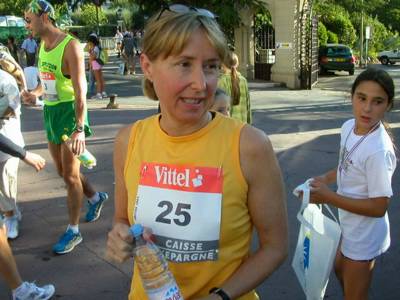
Darlene just before the start of the Course Pedestere du Boulevard Carnot, noticing that most of the other entrants seem to be seasoned runners, as compared with the more casual field in a U.S. race.
Sunday, September 19, 2004
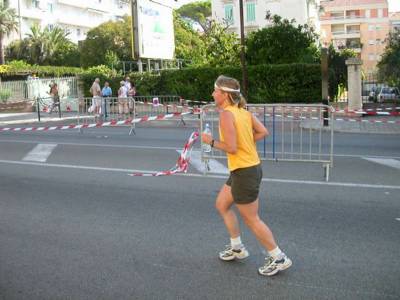
When we drove the route yesterday, Darlene didn't realize she would be running it twice. She would pass our apartment four times.
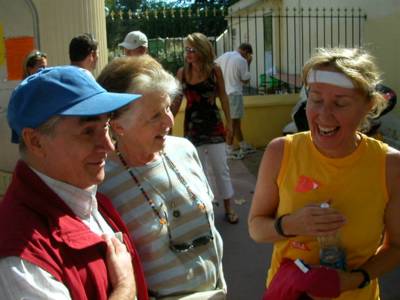
At the toughest uphill part of the course, Darlene was amazed and delighted to see two familiar faces cheering her on from the sidewalk, Andre and Jacqueline Letullier, Francoise's cousins. "We've just got to go and support her," Jacqueline had told Andre. "I felt so touched that they would come," Darlene said. "I couldn't believe it--I felt such incredible joy to see them, I can't describe it. At that point, I was in shock that I would have to run the entire course twice. But I knew I had to do it, because they would be there to cheer me on when I went by again."


